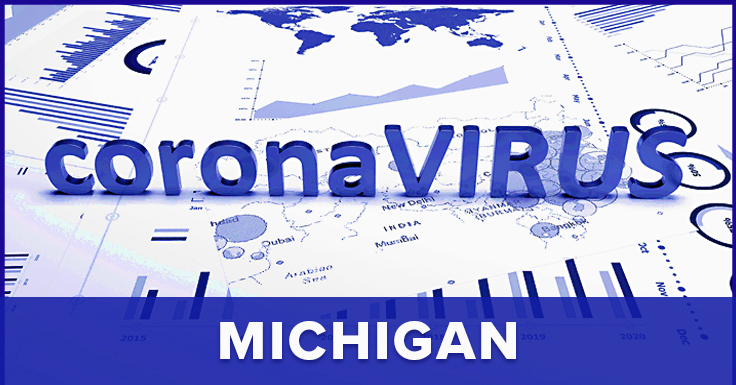October 2, 2020
 The Michigan Supreme Court concluded today that Gov. Whitmer did not have authority after April 30, 2020, to issue or renew any executive orders related to the COVID-19 pandemic under the Emergency Management Act of 1976 ("EMA") or the Emergency Powers of the Governor Act of 1945 ("EPGA").
The Michigan Supreme Court concluded today that Gov. Whitmer did not have authority after April 30, 2020, to issue or renew any executive orders related to the COVID-19 pandemic under the Emergency Management Act of 1976 ("EMA") or the Emergency Powers of the Governor Act of 1945 ("EPGA").
The Decision
The Court's opinion answered two legal questions certified by the U.S. District Court for the Western District of Michigan in a federal court lawsuit brought against Governor Whitmer, the Attorney General, and the Health and Human Services Director by three medical facilities and a patient. The plaintiffs, who claim to have been negatively impacted by Governor Whitmer's executive orders restricting non-essential healthcare services during the COVID-19 pandemic, allege that the state statutes authorizing the executive orders are unconstitutional and violate the Commerce Clause of the U.S. Constitution, and further allege that the executive orders deprived the plaintiffs of substantive and procedural due process. Because the lawsuit relates to state statutes, U.S. District Court Judge Paul L. Maloney asked the Michigan Supreme Court to answer two certified questions (i.e., to give the federal court its opinion on a matter of state law):
- Whether, under the Emergency Powers of the Governor Act, MCL § 10.31, et seq., or the Emergency Management Act, MCL § 30.401, et seq., Governor Whitmer has the authority after April 30, 2020 to issue or renew any executive orders related to the COVID-19 pandemic, and
- Whether the Emergency Powers of the Governor Act and/or the Emergency Management Act violates the Separation of Powers and/or the Non-Delegation Clauses of the Michigan Constitution.
As to the first question, the Michigan Supreme Court unanimously held that the Governor did not have authority to issue pandemic-related executive orders after April 30, 2020, under the EMA. As to the remaining issues, the Justices were divided 4-3, but the majority held that the Governor also did not have authority to issue pandemic-related executive orders after April 30, 2020, under the EPGA because the EPGA unlawfully delegates legislative power to the executive branch in violation of the Michigan Constitution.
According to the Court, under the EMA, the Governor could only declare a state of emergency or state of disaster once and then had to terminate that declaration when the Legislature did not authorize an extension. The Court further found that the EPGA improperly delegated legislative authority to the executive branch because it granted impermissibly broad and indefinite powers to the Governor. Consequently, the Court held that "the EPGA cannot continue to provide a basis for the Governor to exercise emergency powers."
What Happens Next?
Because the Michigan Supreme Court was answering certified questions from the federal district court, the next step is for the federal district court to enter an order based on the Supreme Court's decision. No order has been entered as of this release. Once a district court order is entered, the order could take immediate effect (if ordered by the district court judge), or it could be stayed for a period of 30 days under the federal court's rules. Any district court order can be appealed to the U.S. Court of Appeals for the Sixth Circuit. The Governor's office has issued a press release stating that the Supreme Court's order will not take effect for 21 days, based presumably on the time that the Michigan Court Rules allows for motions for reconsideration.
Despite these additional procedural steps, the Michigan Supreme Court has made its position clear that the executive orders promulgated under the EMA and EPGA are not enforceable. This means that in the near future, COVID-19 safety protocols may be governed by county health department orders (which are issued under different statutory authority), local ordinances, and statewide legislation. This also leads to many questions for the businesses and communities who have relied on the executive orders in recent months.
Foster Swift has teams of attorneys prepared to address the issues that this decision will present for all of our clients, including businesses, municipalities and libraries, healthcare providers, and public and private employers and their insurance carriers.
For questions or assistance related to COVID-19, contact your Foster Swift attorney or a member of Foster Swift’s Coronavirus Task Force:
- Mid-Michigan & Southeast Michigan - Matthew Fedor | 248.785.4734 | mfedor@fosterswift.com
- West & Northern Michigan - Laura Genovich | 616.726.2238 | lgenovich@fosterswift.com
Or contact the leaders of any of our practice areas, who are continuously monitoring the legal impacts of COVID-19:
- Business & Tax Law
- Mindi Johnson | 616..726.2252 | mjohnson@fosterswift.com
- Joel Farrar | 517.371.8305 | jfarrar@fosterswift.com
- Employer Services
- Michael Blum | 248.785.4722 | mblum@fosterswift.com
- Finance, Real Estate & Bankruptcy
- Patricia Scott | 517.371.8132 | pscott@fosterswift.com
- Health Care
- Jennifer Van Regenmorter | 616.796.2502 | jvanregenmorter@fosterswift.com
- Litigation
- Paul Millenbach | 248.539.9908 | pmillenbach@fosterswift.com
- Andrew Vredenburg | 616.726.2234 | avredenburg@fosterswift.com
- Municipal
- Michael Homier | 616.726.2230 | mhomier@fosterswift.com
- Trusts & Estates
- Warren Krueger | 517.371.8236 | wkrueger@fosterswift.com
- Workers' Compensation
- Brian Goodenough | 517.371.8147 | bgoodenough@fosterswift.com
To read the COVID-19 updates published by our practice groups - from municipal law to workers compensation to tax law - please visit https://www.fosterswift.com/f-coronavirus-legal-resource-page.html



 Share
Share